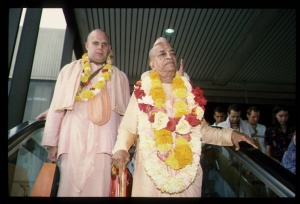SB 1.9.13: Difference between revisions
m (1 revision(s)) |
(Vanibot #0020: VersionCompareLinker - added a link to the Version Compare feature) |
||
| Line 1: | Line 1: | ||
{{info | {{info | ||
|speaker= | |speaker=Bhīṣmadeva | ||
|listener=King | |listener=King Yudhiṣṭhira and assembly | ||
}} | }} | ||
[[Category:Srimad-Bhagavatam - Canto 01 Chapter 09]] | |||
[[Category:Bhagavatam Verses Spoken by Bhismadeva - Vanisource|010913]] | |||
<div style="float:left">'''[[Srimad-Bhagavatam]] - [[SB 1|First Canto]] - [[SB 1.9: The Passing Away of Bhismadeva in the Presence of Lord Krsna|Chapter 9: The Passing Away of Bhīṣmadeva in the Presence of Lord Kṛṣṇa]]'''</div> | |||
<div style="float:right">[[File:Go-previous.png|link=SB 1.9.12]] '''[[SB 1.9.12]] - [[SB 1.9.14]]''' [[File:Go-next.png|link=SB 1.9.14]]</div> | |||
{{CompareVersions|SB|1.9.13|SB 1964|SB 1972-77}} | |||
{{RandomImage}} | |||
==== TEXT 13 ==== | ==== TEXT 13 ==== | ||
<div | <div class="verse"> | ||
saṁsthite 'tirathe pāṇḍau | :saṁsthite 'tirathe pāṇḍau | ||
pṛthā bāla-prajā vadhūḥ | :pṛthā bāla-prajā vadhūḥ | ||
yuṣmat-kṛte bahūn kleśān | :yuṣmat-kṛte bahūn kleśān | ||
prāptā tokavatī muhuḥ | :prāptā tokavatī muhuḥ | ||
</div> | </div> | ||
| Line 17: | Line 23: | ||
==== SYNONYMS ==== | ==== SYNONYMS ==== | ||
<div | <div class="synonyms"> | ||
''saṁsthite''—after the demise; ''ati-rathe''—of the great general; ''pāṇḍau''—Pāṇḍu; ''pṛthā''—Kuntī; ''bāla-prajā''—having young children; ''vadhūḥ''—my daughter-in-law; ''yuṣmat-kṛte''—on your account; ''bahūn''—multifarious; ''kleśān''—afflictions; ''prāptā''—underwent; ''toka-vatī''—in spite of having grown-up boys; ''muhuḥ''—constantly. | |||
</div> | </div> | ||
| Line 24: | Line 30: | ||
==== TRANSLATION ==== | ==== TRANSLATION ==== | ||
<div | <div class="translation"> | ||
As far as my daughter-in-law Kuntī is concerned, upon the great General Pāṇḍu's death, she became a widow with many children, and therefore she suffered greatly. And when you were grown up she suffered a great deal also because of your actions. | As far as my daughter-in-law Kuntī is concerned, upon the great General Pāṇḍu's death, she became a widow with many children, and therefore she suffered greatly. And when you were grown up she suffered a great deal also because of your actions. | ||
</div> | </div> | ||
| Line 31: | Line 37: | ||
==== PURPORT ==== | ==== PURPORT ==== | ||
<div | <div class="purport"> | ||
The sufferings of Kuntīdevī are doubly lamented. She suffered greatly because of early widowhood and to get her minor children brought up in the royal family. And when her children were grown up, she continued to suffer because of her sons' actions. So her sufferings continued. This means that she was destined to suffer by providence, and this one has to tolerate without being disturbed. | The sufferings of Kuntīdevī are doubly lamented. She suffered greatly because of early widowhood and to get her minor children brought up in the royal family. And when her children were grown up, she continued to suffer because of her sons' actions. So her sufferings continued. This means that she was destined to suffer by providence, and this one has to tolerate without being disturbed. | ||
</div> | </div> | ||
__NOTOC__ | |||
<div style="float:right; clear:both;">[[File:Go-previous.png|link=SB 1.9.12]] '''[[SB 1.9.12]] - [[SB 1.9.14]]''' [[File:Go-next.png|link=SB 1.9.14]]</div> | |||
__NOTOC__ | |||
__NOEDITSECTION__ | |||
Revision as of 12:20, 25 May 2020

A.C. Bhaktivedanta Swami Prabhupada
TEXT 13
- saṁsthite 'tirathe pāṇḍau
- pṛthā bāla-prajā vadhūḥ
- yuṣmat-kṛte bahūn kleśān
- prāptā tokavatī muhuḥ
SYNONYMS
saṁsthite—after the demise; ati-rathe—of the great general; pāṇḍau—Pāṇḍu; pṛthā—Kuntī; bāla-prajā—having young children; vadhūḥ—my daughter-in-law; yuṣmat-kṛte—on your account; bahūn—multifarious; kleśān—afflictions; prāptā—underwent; toka-vatī—in spite of having grown-up boys; muhuḥ—constantly.
TRANSLATION
As far as my daughter-in-law Kuntī is concerned, upon the great General Pāṇḍu's death, she became a widow with many children, and therefore she suffered greatly. And when you were grown up she suffered a great deal also because of your actions.
PURPORT
The sufferings of Kuntīdevī are doubly lamented. She suffered greatly because of early widowhood and to get her minor children brought up in the royal family. And when her children were grown up, she continued to suffer because of her sons' actions. So her sufferings continued. This means that she was destined to suffer by providence, and this one has to tolerate without being disturbed.